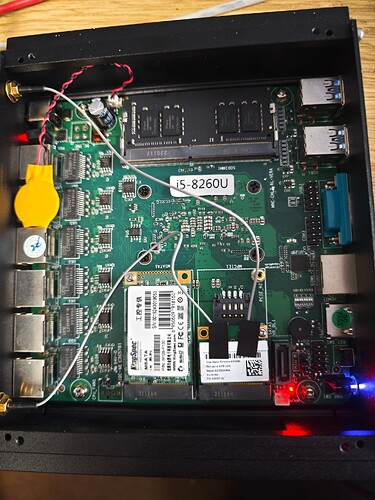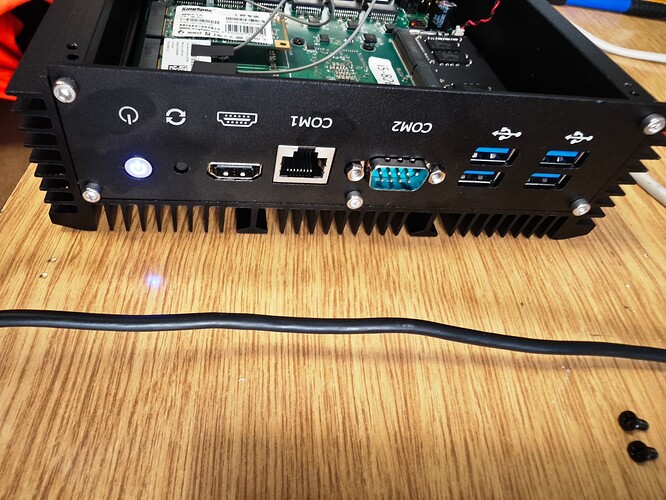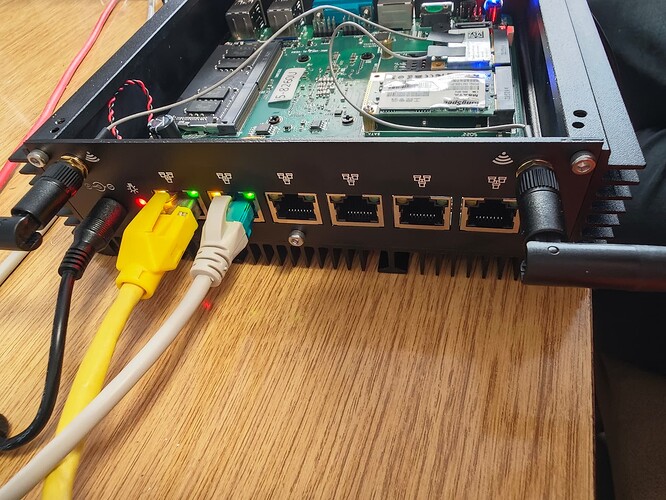Short answer:
It is the chipset you are looking for; not the card.
So to put all detals on this thread/question
dmesg
dmesg
---<<BOOT>>---
Copyright (c) 1992-2023 The FreeBSD Project.
Copyright (c) 1979, 1980, 1983, 1986, 1988, 1989, 1991, 1992, 1993, 1994
The Regents of the University of California. All rights reserved.
FreeBSD is a registered trademark of The FreeBSD Foundation.
FreeBSD 14.1-RELEASE-p3 stable/24.7-n267778-bb2c86773c1b SMP amd64
FreeBSD clang version 18.1.5 (https://github.com/llvm/llvm-project.git llvmorg-1 8.1.5-0-g617a15a9eac9)
VT(efifb): resolution 800x600
CPU: Intel(R) Core(TM) i5-8260U CPU @ 1.60GHz (1800.00-MHz K8-class CPU)
Origin="GenuineIntel" Id=0x806ea Family=0x6 Model=0x8e Stepping=10
Features=0xbfebfbff<FPU,VME,DE,PSE,TSC,MSR,PAE,MCE,CX8,APIC,SEP,MTRR,PGE,MCA,C MOV,PAT,PSE36,CLFLUSH,DTS,ACPI,MMX,FXSR,SSE,SSE2,SS,HTT,TM,PBE>
Features2=0x7ffafbbf<SSE3,PCLMULQDQ,DTES64,MON,DS_CPL,VMX,EST,TM2,SSSE3,SDBG,F MA,CX16,xTPR,PDCM,PCID,SSE4.1,SSE4.2,x2APIC,MOVBE,POPCNT,TSCDLT,AESNI,XSAVE,OSXS AVE,AVX,F16C,RDRAND>
AMD Features=0x2c100800<SYSCALL,NX,Page1GB,RDTSCP,LM>
AMD Features2=0x121<LAHF,ABM,Prefetch>
Structured Extended Features=0x29c67af<FSGSBASE,TSCADJ,SGX,BMI1,AVX2,SMEP,BMI2 ,ERMS,INVPCID,NFPUSG,MPX,RDSEED,ADX,SMAP,CLFLUSHOPT,PROCTRACE>
Structured Extended Features3=0x9c002400<MD_CLEAR,TSXFA,IBPB,STIBP,L1DFL,SSBD>
XSAVE Features=0xf<XSAVEOPT,XSAVEC,XINUSE,XSAVES>
VT-x: PAT,HLT,MTF,PAUSE,EPT,UG,VPID
TSC: P-state invariant, performance statistics
real memory = 8589934592 (8192 MB)
avail memory = 8130678784 (7754 MB)
Event timer "LAPIC" quality 600
ACPI APIC Table: <ALASKA A M I >
FreeBSD/SMP: Multiprocessor System Detected: 8 CPUs
FreeBSD/SMP: 1 package(s) x 4 core(s) x 2 hardware threads
random: registering fast source Intel Secure Key RNG
random: fast provider: "Intel Secure Key RNG"
random: unblocking device.
ioapic0 <Version 2.0> irqs 0-119
Launching APs: 1 3 2 4 6 7 5
random: entropy device external interface
wlan: mac acl policy registered
kbd1 at kbdmux0
WARNING: Device "spkr" is Giant locked and may be deleted before FreeBSD 15.0.
efirtc0: <EFI Realtime Clock>
efirtc0: registered as a time-of-day clock, resolution 1.000000s
smbios0: <System Management BIOS> at iomem 0x8c9c9000-0x8c9c901e
smbios0: Version: 3.2, BCD Revision: 3.2
aesni0: <AES-CBC,AES-CCM,AES-GCM,AES-ICM,AES-XTS>
acpi0: <ALASKA A M I >
acpi0: Power Button (fixed)
cpu0: <ACPI CPU> on acpi0
hpet0: <High Precision Event Timer> iomem 0xfed00000-0xfed003ff on acpi0
Timecounter "HPET" frequency 24000000 Hz quality 950
Event timer "HPET" frequency 24000000 Hz quality 550
atrtc1: <AT realtime clock> on acpi0
atrtc1: Warning: Couldn't map I/O.
atrtc1: registered as a time-of-day clock, resolution 1.000000s
Event timer "RTC" frequency 32768 Hz quality 0
attimer0: <AT timer> port 0x40-0x43,0x50-0x53 irq 0 on acpi0
Timecounter "i8254" frequency 1193182 Hz quality 0
Event timer "i8254" frequency 1193182 Hz quality 100
Timecounter "ACPI-fast" frequency 3579545 Hz quality 900
acpi_timer0: <24-bit timer at 3.579545MHz> port 0x1808-0x180b on acpi0
pcib0: <ACPI Host-PCI bridge> port 0xcf8-0xcff on acpi0
pci0: <ACPI PCI bus> on pcib0
vgapci0: <VGA-compatible display> port 0x3000-0x303f mem 0xa0000000-0xa0ffffff,0 x90000000-0x9fffffff irq 16 at device 2.0 on pci0
vgapci0: Boot video device
xhci0: <XHCI (generic) USB 3.0 controller> mem 0xa1e00000-0xa1e0ffff irq 16 at d evice 20.0 on pci0
xhci0: 32 bytes context size, 64-bit DMA
usbus0: waiting for BIOS to give up control
xhci_interrupt: host controller halted
usbus0 on xhci0
usbus0: 5.0Gbps Super Speed USB v3.0
pci0: <memory, RAM> at device 20.2 (no driver attached)
pci0: <simple comms> at device 22.0 (no driver attached)
ahci0: <AHCI SATA controller> port 0x3090-0x3097,0x3080-0x3083,0x3060-0x307f mem 0xa1e14000-0xa1e15fff,0xa1e1a000-0xa1e1a0ff,0xa1e19000-0xa1e197ff irq 16 at dev ice 23.0 on pci0
ahci0: AHCI v1.31 with 2 6Gbps ports, Port Multiplier not supported
ahcich0: <AHCI channel> at channel 0 on ahci0
ahcich1: <AHCI channel> at channel 1 on ahci0
pcib1: <ACPI PCI-PCI bridge> irq 16 at device 28.0 on pci0
pci1: <ACPI PCI bus> on pcib1
igc0: <Intel(R) Ethernet Controller I225-V> mem 0xa1b00000-0xa1bfffff,0xa1c00000 -0xa1c03fff irq 16 at device 0.0 on pci1
igc0: Using 1024 TX descriptors and 1024 RX descriptors
igc0: Using 4 RX queues 4 TX queues
igc0: Using MSI-X interrupts with 5 vectors
igc0: Ethernet address: 10:03:02:44:09:b4
igc0: netmap queues/slots: TX 4/1024, RX 4/1024
pcib2: <ACPI PCI-PCI bridge> irq 17 at device 28.5 on pci0
pci2: <ACPI PCI bus> on pcib2
igc1: <Intel(R) Ethernet Controller I225-V> mem 0xa1900000-0xa19fffff,0xa1a00000 -0xa1a03fff irq 17 at device 0.0 on pci2
igc1: Using 1024 TX descriptors and 1024 RX descriptors
igc1: Using 4 RX queues 4 TX queues
igc1: Using MSI-X interrupts with 5 vectors
igc1: Ethernet address: 10:03:02:44:09:b5
igc1: netmap queues/slots: TX 4/1024, RX 4/1024
pcib3: <ACPI PCI-PCI bridge> irq 18 at device 28.6 on pci0
pci3: <ACPI PCI bus> on pcib3
igc2: <Intel(R) Ethernet Controller I225-V> mem 0xa1700000-0xa17fffff,0xa1800000 -0xa1803fff irq 18 at device 0.0 on pci3
igc2: Using 1024 TX descriptors and 1024 RX descriptors
igc2: Using 4 RX queues 4 TX queues
igc2: Using MSI-X interrupts with 5 vectors
igc2: Ethernet address: 10:03:02:44:09:b6
igc2: netmap queues/slots: TX 4/1024, RX 4/1024
pcib4: <ACPI PCI-PCI bridge> irq 19 at device 28.7 on pci0
pci4: <ACPI PCI bus> on pcib4
igc3: <Intel(R) Ethernet Controller I225-V> mem 0xa1500000-0xa15fffff,0xa1600000 -0xa1603fff irq 19 at device 0.0 on pci4
igc3: Using 1024 TX descriptors and 1024 RX descriptors
igc3: Using 4 RX queues 4 TX queues
igc3: Using MSI-X interrupts with 5 vectors
igc3: Ethernet address: 10:03:02:44:09:b7
igc3: netmap queues/slots: TX 4/1024, RX 4/1024
pcib5: <ACPI PCI-PCI bridge> irq 16 at device 29.0 on pci0
pci5: <ACPI PCI bus> on pcib5
igc4: <Intel(R) Ethernet Controller I225-V> mem 0xa1300000-0xa13fffff,0xa1400000 -0xa1403fff irq 16 at device 0.0 on pci5
igc4: Using 1024 TX descriptors and 1024 RX descriptors
igc4: Using 4 RX queues 4 TX queues
igc4: Using MSI-X interrupts with 5 vectors
igc4: Ethernet address: 10:03:02:44:09:b8
igc4: netmap queues/slots: TX 4/1024, RX 4/1024
pcib6: <ACPI PCI-PCI bridge> irq 17 at device 29.1 on pci0
pci6: <ACPI PCI bus> on pcib6
igc5: <Intel(R) Ethernet Controller I225-V> mem 0xa1100000-0xa11fffff,0xa1200000 -0xa1203fff irq 17 at device 0.0 on pci6
igc5: Using 1024 TX descriptors and 1024 RX descriptors
igc5: Using 4 RX queues 4 TX queues
igc5: Using MSI-X interrupts with 5 vectors
igc5: Ethernet address: 10:03:02:44:09:b9
igc5: netmap queues/slots: TX 4/1024, RX 4/1024
pcib7: <ACPI PCI-PCI bridge> irq 17 at device 29.5 on pci0
pci7: <ACPI PCI bus> on pcib7
ppt0 mem 0xa1d00000-0xa1d03fff irq 17 at device 0.0 on pci7
isab0: <PCI-ISA bridge> at device 31.0 on pci0
isa0: <ISA bus> on isab0
hdac0: <Intel Cannon Lake HDA Controller> mem 0xa1e10000-0xa1e13fff,0xa1000000-0 xa10fffff irq 16 at device 31.3 on pci0
pci0: <serial bus> at device 31.5 (no driver attached)
acpi_button0: <Sleep Button> on acpi0
acpi_button1: <Power Button> on acpi0
acpi_tz0: <Thermal Zone> on acpi0
ns8250: UART FCR is broken
ns8250: UART FCR is broken
uart0: <16550 or compatible> port 0x3f8-0x3ff irq 4 flags 0x10 on acpi0
ns8250: UART FCR is broken
ns8250: UART FCR is broken
uart1: <16550 or compatible> port 0x2f8-0x2ff irq 3 on acpi0
acpi_syscontainer0: <System Container> on acpi0
orm0: <ISA Option ROM> at iomem 0xc0000-0xcffff pnpid ORM0000 on isa0
atrtc0: <AT realtime clock> at port 0x70 irq 8 on isa0
atrtc0: Warning: Couldn't map I/O.
atrtc0: registered as a time-of-day clock, resolution 1.000000s
atrtc0: Can't map interrupt.
hwpstate_intel0: <Intel Speed Shift> on cpu0
hwpstate_intel1: <Intel Speed Shift> on cpu1
hwpstate_intel2: <Intel Speed Shift> on cpu2
hwpstate_intel3: <Intel Speed Shift> on cpu3
hwpstate_intel4: <Intel Speed Shift> on cpu4
hwpstate_intel5: <Intel Speed Shift> on cpu5
hwpstate_intel6: <Intel Speed Shift> on cpu6
hwpstate_intel7: <Intel Speed Shift> on cpu7
Timecounter "TSC" frequency 1799979763 Hz quality 1000
Timecounters tick every 1.000 msec
ZFS filesystem version: 5
ZFS storage pool version: features support (5000)
hdacc0: <Intel Kaby Lake HDA CODEC> at cad 2 on hdac0
hdaa0: <Intel Kaby Lake Audio Function Group> at nid 1 on hdacc0
pcm0: <Intel Kaby Lake (HDMI/DP 8ch)> at nid 3 on hdaa0
ada0 at ahcich0 bus 0 scbus0 target 0 lun 0
ada0: <IM128-P130 SBFQP1.5> ACS-4 ATA SATA 3.x device
ada0: Serial Number 0019243001548
ada0: 600.000MB/s transfers (SATA 3.x, UDMA6, PIO 8192bytes)
ada0: Command Queueing enabled
ada0: 122104MB (250069680 512 byte sectors)
Trying to mount root from zfs:zroot/ROOT/default []...
ugen0.1: <Intel XHCI root HUB> at usbus0
uhub0 on usbus0
uhub0: <Intel XHCI root HUB, class 9/0, rev 3.00/1.00, addr 1> on usbus0
uhub0: 18 ports with 18 removable, self powered
Root mount waiting for: usbus0
ugen0.2: <vendor 0x8087 product 0x0029> at usbus0
igc0: link state changed to UP
igc1: link state changed to UP
pchtherm0: <CannonLake-LP Thermal Subsystem> mem 0xa1e1d000-0xa1e1dfff irq 16 at device 18.0 on pci0
acpi_wmi0: <ACPI-WMI mapping> on acpi0
acpi_wmi0: cannot find EC device
acpi_wmi1: <ACPI-WMI mapping> on acpi0
acpi_wmi1: cannot find EC device
acpi_wmi1: Embedded MOF found
ACPI: \134_SB.WFDE.WQCC: 1 arguments were passed to a non-method ACPI object (Bu ffer) (20221020/nsarguments-361)
acpi_wmi2: <ACPI-WMI mapping> on acpi0
acpi_wmi2: cannot find EC device
acpi_wmi2: Embedded MOF found
ACPI: \134_SB.WFTE.WQCC: 1 arguments were passed to a non-method ACPI object (Bu ffer) (20221020/nsarguments-361)
lo0: link state changed to UP
pflog0: permanently promiscuous mode enabled
igc1: link state changed to DOWN
igc0: link state changed to DOWN
igc0: link state changed to UP
igc1: link state changed to UP
bridge0: Ethernet address: 58:9c:fc:10:f9:16
bridge0: link state changed to UP
igc1: promiscuous mode enabled
tap0: Ethernet address: 58:9c:fc:10:28:75
tap0: promiscuous mode enabled
tap0: link state changed to UP
pciconf -lv
pciconf -lv
hostb0@pci0:0:0:0: class=0x060000 rev=0x08 hdr=0x00 vendor=0x8086 device=0x3ed0 subvendor=0x8086 subdevice=0x7270
vendor = 'Intel Corporation'
device = '8th Gen Core Processor Host Bridge/DRAM Registers'
class = bridge
subclass = HOST-PCI
vgapci0@pci0:0:2:0: class=0x030000 rev=0x01 hdr=0x00 vendor=0x8086 device=0x3ea9 subvendor=0x8086 subdevice=0x2212
vendor = 'Intel Corporation'
device = 'Coffee Lake-U GT2 [UHD Graphics 620]'
class = display
subclass = VGA
none0@pci0:0:8:0: class=0x088000 rev=0x00 hdr=0x00 vendor=0x8086 device=0x1911 subvendor=0x8086 subdevice=0x7270
vendor = 'Intel Corporation'
device = 'Xeon E3-1200 v5/v6 / E3-1500 v5 / 6th/7th/8th Gen Core Processor Gaussian Mixture Model'
class = base peripheral
pchtherm0@pci0:0:18:0: class=0x118000 rev=0x30 hdr=0x00 vendor=0x8086 device=0x9df9 subvendor=0x8086 subdevice=0x7270
vendor = 'Intel Corporation'
device = 'Cannon Point-LP Thermal Controller'
class = dasp
xhci0@pci0:0:20:0: class=0x0c0330 rev=0x30 hdr=0x00 vendor=0x8086 device=0x9ded subvendor=0x8086 subdevice=0x7270
vendor = 'Intel Corporation'
device = 'Cannon Point-LP USB 3.1 xHCI Controller'
class = serial bus
subclass = USB
none1@pci0:0:20:2: class=0x050000 rev=0x30 hdr=0x00 vendor=0x8086 device=0x9def subvendor=0x8086 subdevice=0x7270
vendor = 'Intel Corporation'
device = 'Cannon Point-LP Shared SRAM'
class = memory
subclass = RAM
none2@pci0:0:22:0: class=0x078000 rev=0x30 hdr=0x00 vendor=0x8086 device=0x9de0 subvendor=0x8086 subdevice=0x7270
vendor = 'Intel Corporation'
device = 'Cannon Point-LP MEI Controller'
class = simple comms
ahci0@pci0:0:23:0: class=0x010601 rev=0x30 hdr=0x00 vendor=0x8086 device=0x9dd3 subvendor=0x8086 subdevice=0x7270
vendor = 'Intel Corporation'
device = 'Cannon Point-LP SATA Controller [AHCI Mode]'
class = mass storage
subclass = SATA
pcib1@pci0:0:28:0: class=0x060400 rev=0xf0 hdr=0x01 vendor=0x8086 device=0x9dbc subvendor=0x8086 subdevice=0x7270
vendor = 'Intel Corporation'
device = 'Cannon Point-LP PCI Express Root Port'
class = bridge
subclass = PCI-PCI
pcib2@pci0:0:28:5: class=0x060400 rev=0xf0 hdr=0x01 vendor=0x8086 device=0x9dbd subvendor=0x8086 subdevice=0x7270
vendor = 'Intel Corporation'
class = bridge
subclass = PCI-PCI
pcib3@pci0:0:28:6: class=0x060400 rev=0xf0 hdr=0x01 vendor=0x8086 device=0x9dbe subvendor=0x8086 subdevice=0x7270
vendor = 'Intel Corporation'
device = 'Cannon Point-LP PCI Express Root Port'
class = bridge
subclass = PCI-PCI
pcib4@pci0:0:28:7: class=0x060400 rev=0xf0 hdr=0x01 vendor=0x8086 device=0x9dbf subvendor=0x8086 subdevice=0x7270
vendor = 'Intel Corporation'
device = 'Cannon Point PCI Express Root Port'
class = bridge
subclass = PCI-PCI
pcib5@pci0:0:29:0: class=0x060400 rev=0xf0 hdr=0x01 vendor=0x8086 device=0x9db0 subvendor=0x8086 subdevice=0x7270
vendor = 'Intel Corporation'
device = 'Cannon Point-LP PCI Express Root Port'
class = bridge
subclass = PCI-PCI
pcib6@pci0:0:29:1: class=0x060400 rev=0xf0 hdr=0x01 vendor=0x8086 device=0x9db1 subvendor=0x8086 subdevice=0x7270
vendor = 'Intel Corporation'
device = 'Cannon Point-LP PCI Express Root Port'
class = bridge
subclass = PCI-PCI
pcib7@pci0:0:29:5: class=0x060400 rev=0xf0 hdr=0x01 vendor=0x8086 device=0x9db5 subvendor=0x8086 subdevice=0x7270
vendor = 'Intel Corporation'
class = bridge
subclass = PCI-PCI
isab0@pci0:0:31:0: class=0x060100 rev=0x30 hdr=0x00 vendor=0x8086 device=0x9d84 subvendor=0x8086 subdevice=0x7270
vendor = 'Intel Corporation'
device = 'Cannon Point-LP LPC Controller'
class = bridge
subclass = PCI-ISA
hdac0@pci0:0:31:3: class=0x040300 rev=0x30 hdr=0x00 vendor=0x8086 device=0x9dc8 subvendor=0x8086 subdevice=0x7270
vendor = 'Intel Corporation'
device = 'Cannon Point-LP High Definition Audio Controller'
class = multimedia
subclass = HDA
none3@pci0:0:31:4: class=0x0c0500 rev=0x30 hdr=0x00 vendor=0x8086 device=0x9da3 subvendor=0x8086 subdevice=0x7270
vendor = 'Intel Corporation'
device = 'Cannon Point-LP SMBus Controller'
class = serial bus
subclass = SMBus
none4@pci0:0:31:5: class=0x0c8000 rev=0x30 hdr=0x00 vendor=0x8086 device=0x9da4 subvendor=0x8086 subdevice=0x7270
vendor = 'Intel Corporation'
device = 'Cannon Point-LP SPI Controller'
class = serial bus
igc0@pci0:1:0:0: class=0x020000 rev=0x03 hdr=0x00 vendor=0x8086 device=0x15f3 subvendor=0x8086 subdevice=0x0000
vendor = 'Intel Corporation'
device = 'Ethernet Controller I225-V'
class = network
subclass = ethernet
igc1@pci0:2:0:0: class=0x020000 rev=0x03 hdr=0x00 vendor=0x8086 device=0x15f3 subvendor=0x8086 subdevice=0x0000
vendor = 'Intel Corporation'
device = 'Ethernet Controller I225-V'
class = network
subclass = ethernet
igc2@pci0:3:0:0: class=0x020000 rev=0x03 hdr=0x00 vendor=0x8086 device=0x15f3 subvendor=0x8086 subdevice=0x0000
vendor = 'Intel Corporation'
device = 'Ethernet Controller I225-V'
class = network
subclass = ethernet
igc3@pci0:4:0:0: class=0x020000 rev=0x03 hdr=0x00 vendor=0x8086 device=0x15f3 subvendor=0x8086 subdevice=0x0000
vendor = 'Intel Corporation'
device = 'Ethernet Controller I225-V'
class = network
subclass = ethernet
igc4@pci0:5:0:0: class=0x020000 rev=0x03 hdr=0x00 vendor=0x8086 device=0x15f3 subvendor=0x8086 subdevice=0x0000
vendor = 'Intel Corporation'
device = 'Ethernet Controller I225-V'
class = network
subclass = ethernet
igc5@pci0:6:0:0: class=0x020000 rev=0x03 hdr=0x00 vendor=0x8086 device=0x15f3 subvendor=0x8086 subdevice=0x0000
vendor = 'Intel Corporation'
device = 'Ethernet Controller I225-V'
class = network
subclass = ethernet
ppt0@pci0:7:0:0: class=0x028000 rev=0x1a hdr=0x00 vendor=0x8086 device=0x2723 subvendor=0x8086 subdevice=0x008c
vendor = 'Intel Corporation'
device = 'Wi-Fi 6 AX200'
class = network
And images
FreeBSD is a registered trademark of The FreeBSD Foundation. FreeBSD 14.1-RELEASE-p3 stable/24.7-n267778-bb2c86773c1b SMP amd64
why exactly are we having this conversation, here ... ?
why exactly are we having this conversation, here ... ?
Is there someplace other than 'here'?
Because we are 'here' to help..?
They/we/I/u have a misunderstanding.
And we all know you have the skills.
Are you not up to explaining it?
Just don't.
Point out the digression.
OP isn't using openwrt, this was made clear by them a long time ago,
and when the conversation now shifts from pure hw, to sw, it's kind of OT...
Im not sure what u have against me and why u are so rude to people, but as i explane before i put opnsense and virtual machine bridged openwrt... As i supose i cant get hardware specs from virtual i do it over root software called opnsense on freebsd. If u hate me so much please ignore a thread, i need help not haters.
but as i explane before i put opnsense and virtual machine bridged openwrt
then you should probably create a new thread, instead of suddenly shifting the topic ?
Well:
Someone missed the context.
That makes little sense. Opnsense and openwrt do basically the same role, virtualising one in the other add complexity without benefit
I'd like to read why; and you can take it all out on me; as opposed to the OP.
Oh I’m interested as well, maybe there’s something I’m not thinking of
It is quite simple - FreeBSD supports up to wifi4 AP using mt76 or ath*k , which means 105/300Mbps wifi-a in 5ghz.
Those turn out to be best supported by OpenWRT if you go for it.
6GHz 6E is out of question, it requires wifi6/ax/he which *bsd cannot do.
M.2 is 2 PCIE slots, so 2-chip 2-radio card is most compact solution possible.
M.2 is 2 PCIE slots, so 2-chip 2-radio card is most compact solution possible.
With what chipset?
The ones from AsiaRF, costing more than a normal AP.
Topic closed... ![]()
Probably more reasonable to ask FreeBSD support channel for optimal 2-radio solution in M.2 2T2R form factor bracket. In presence of Opnsense the OpenWRT virtual machine is not an absolute must, but thank OP for considering Linux as a plan B.
U are right, so here is a tutorial for virtual. https://forum.opnsense.org/index.php?topic=34034.0
freebsd is lack of wifi support
topic is Best m2 wifi card for openwrt
then I guess the topic's misleading ?
Its not, as openwrt is bridget with opnsense as seperated system on virtual machine, its literary openwrt so topic is ok,i need best working card for openwrt.



